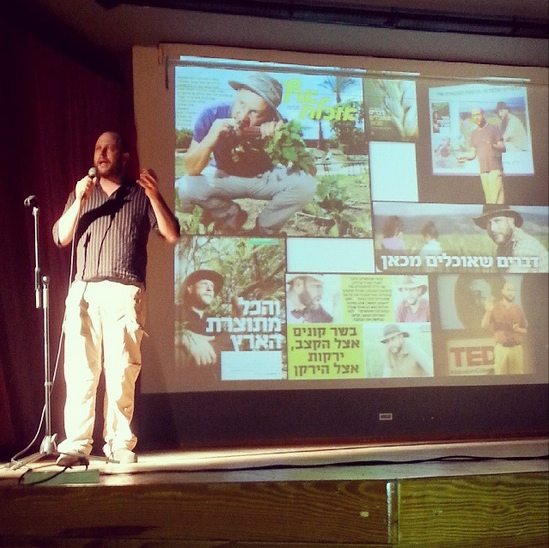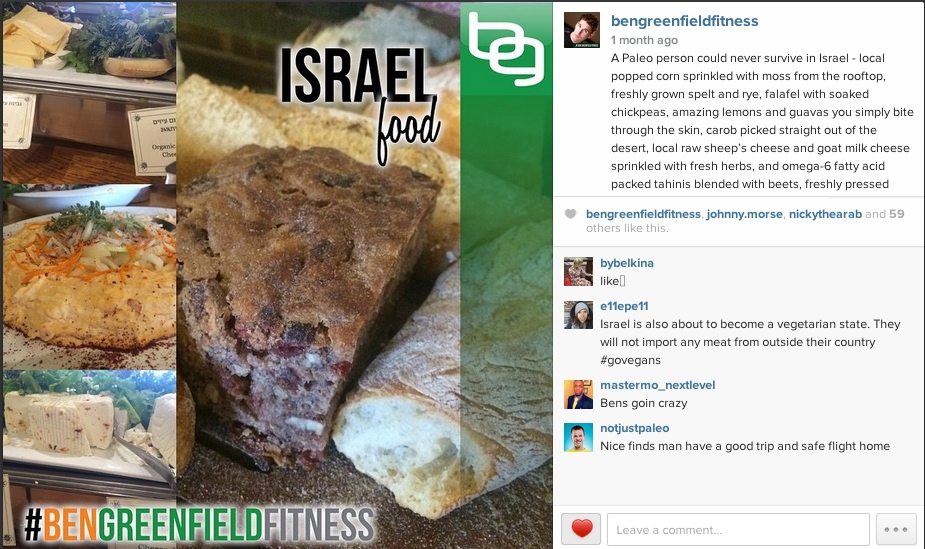December 24, 2014
Click here for the full written transcript of this podcast episode.
A few weeks ago, while I was in Israel, I posted the photo above to my Instagram page, with the comment that…
“A Paleo person could never survive in Israel – local popped corn sprinkled with moss from the rooftop, freshly grown spelt and rye, falafel with soaked chickpeas, amazing lemons and guavas you simply bite through the skin, carob picked straight out of the desert, local raw sheep’s cheese and goat milk cheese sprinkled with fresh herbs, and omega-6 fatty acid packed tahinis blended with beets, freshly pressed olive oil and cilantro. Oh well. More for me.”
I have to admit that I stuffed my face with huge portions of nearly every food listed above when I visited a home in Galilee for a traditional weekly Jewish Shabbat feast. During that dinner, I sat next to Uri Mayer-Chissick (also known as “The Israeli Locavore”), who is a food historian and wild edible plant expert, and we had an interesting about traditional agricultural foods like bread and cheese, and the surge in popularity of the strict avoidance of these foods by those who adhere to a “hunter-gatherer” Paleo-esque diet.
Uri and I delve deeply into this discussion today's audio podcast.
 And this guy is the real deal. Not only does he cook amazing food, but he also leads hikes and tours of the Israeli countryside to find local wild edible plants, and he teaches outdoor cooking classes, gives food history lectures and prepares gourmet meals in nature, reconstructing historical recipes with wild plants.
And this guy is the real deal. Not only does he cook amazing food, but he also leads hikes and tours of the Israeli countryside to find local wild edible plants, and he teaches outdoor cooking classes, gives food history lectures and prepares gourmet meals in nature, reconstructing historical recipes with wild plants.
When he's not traipsing through the valley of springs in north-eastern Israel with a pot and pan in his hand, Uri lectures about food, the history of local food preservation, ways that ancient medicine used nutrition as a way to achieve balance, and the traditions of foraging, healing and cooking in the Mediterranean and Middle-East.
During our discussion, you'll learn:
-How a Paleo diet that adheres to the philosophy of no-bread, no-grains, little to no dairy, etc. has been received in a Mediterranean culture where it seems that bread, legumes, wheat, cheese, etc. are such staples…
-How “traditionally prepared” bread is so much different than modern bread, and how you can find or make easy-to-digest bread…
-How you can prepare things like lentils and chickpeas to make them more friendly to the human gut…
-What it is it some dairy causes health problems, but some dairy is no nourishing and digestible…
-Why a rise in celiac disease is due to a difference in the way wheat is grown…
-And much more!
Resources:
-Vibe Israel, an organization that brings international on- and offline opinion leaders in health and nutrition on a weeklong personalized experience of the burgeoning wellness scene in Israel (I've already released two valuable lessons I learned on that Israel journey: “5 Things You Can Learn From The Burgeoning Health, Wellness And Nutrition Scene In Israel” and “Why You Get Cancer And What You Can Do About It“).
By the way, even though I'm not Paleo, you can click here to come hear me speak at PaleoFX 2015, which is a Who’s Who gathering of the ancestral food and exercise movement, with world-class speakers including best-selling authors, physicians, nutritionists, research scientists, professional athletes, trainers, sustainability and food activists, biohackers, and more.
Question, comments or feedback about the problem with Paleo? Leave your thoughts below!


Agree with the above comment. It really didn’t have anything to do with the Paleo diet other than saying “people ate these foods for thousands of years”. Didn’t really address the lectin or gluten arguments. No compelling arguments to alter my Paleo diet. It more so reinforced a less/no processed food philosophy which I think is great as well.
This was a really good interview. Although it feels like a better title might be "The problems with modern industrial food production." Paleo still seems like a solid choice for a person who wants to avoid the issues caused by eating a lot of processed foods but it is awesome to know that there are healthy ways to eat a lot of the Paleo no-foods without suffering a lot of nasty consequences. Thank you for posting this.
I can't wait to listen to this one, Ben!!